Knives of the Avenger (1966)
Directed by: Mario Bava
Written by: Alberto Liberati, Giorgio Simonelli, Mario Bava
Starring: Cameron Mitchell, Elissa Pichelli, Fausto Tozzi, Luciano Polllentin
ITALY
AKA I COLTELLI DEL VENDICATORE, VIKING MASSACRE, REVENGER’S SWORD
AVAILABLE ON DVD
RUNNING TIME: 85 min
REVIEWED BY: Dr Lenera, Official HCF Critic
SPOILERS
Viking King Arald’s throne is in jeopardy when Arald disappears after setting off on a trading mission for England and is presumed killed at sea. Warlord Hagen begins to terrorise the land and pester Karan, Arald’s wife, to marry him, though hE intends to kill her and her son Moki after he assumes the kingship. Encouraged by a witch who foretells that Arald will return and a stranger will come to help her, Karan and Moki flee to hide in seclusion, though Hagen and his men are constantly searching for her. Then a rugged drifter called Helmut stops by at the cabin where Karan and Moki are hiding to ask for some food….
I thought I’d continue my on-and-off Mario Bava series with a film that is decidedly not a horror and not even really a cult movie like Danger: Diabolik. Knives Of The Avenger is the kind of film that fans of a particular director tend to ignore. It’s not in the genre that the director tended to work in and which he is most famous for, while he was also a director for hire working on a project he did not initiate. Such films, though, can be very interesting precisely for the reasons mentioned above. Quality-wise Knives Of The Avenger still belongs in the bottom half of Bava’s output, while those after a conventional historical actioner are likely to be disappointed. While Bava often made a low budget work magic for him, he isn’t really able do so in Knives Of The Avenger, historical films being a kind of movie which usually tends to require a decent amount of funds to convince. The film remains, though, a rather unusual and surprisingly [or maybe not, considering the director] dark drama that comes off much like a Western relocated to the world of Vikings, and thematically it does connect to some of Bava’s other work.
At the start of 1966, Bava was brought in to direct a Western called A Gunman Called Nebraska [Savage Gringo] when the original director Antonio Roman was was fired by his producer for his slow pace and not meeting the required standards. Bava directed 90% of the film but his name never appeared on the credits. Soon after this, Bava was asked to salvage a second film. Knives Of The Avenger was originally directed by, some say [though there’s no actual evidence who it is] Primo Zeglio, and he’d shot around a quarter of the film before the production ran out of money and was temporarily closed down. Bava, known for working well with scant financial resources, and having already made a good Viking film Erik The Conqueror back in 1960, was asked to step in. He totally threw out the original script by Alberto Liberati and Giorgio Simonelli and rewrote it, binned most of Zeglio’s footage and shot the entire film in six days, most of it on location [around the village of Monciana near Rome] which was unusual for him, though the film also makes use of that beach at Tor Caldara [near Anzio] which turns up in so many Bava films. It seems like the place must have meant something to him though it was probably just convenient for Bava to keep filming there! Bava’s mother had just died prior to shooting and his father was also on the way, which possibly influenced the dynamic of the story. Knives Of The Avenger made money but lapsed into near obscurity.
The first shot is of a tiny Stonehenge on the beach amidst drawings in the sand. As an old witch prophesises a “black cloud” approaching, the camera pans right to the waves and then left to the shore as the barbarians gallop along. Then we get an even longer single-take shot as a simple pan onto breaking waves and back gives a moment for the credits to roll. Karan and Moki are filmed from a low angle, their footprints in the beach sand erased as they move. Then we get a deliberately jarring cutaway to the villainous Hagen addressing his men, shown in huge close-up while his mounted men fill the background, conveying the nature of his power and egotism. This film may not be ‘great’ or ‘typical’ Bava, but the man is still doing his best to make things visually interesting [yet in the service of its story] despite being limited by time and not having many sets within which he can do his amazing lighting schemes. And, helped by the credited cinematographer Antonio Rinaldi [though of course Bava did much of the photography himself], the film is almost a tribute to Bava’s favourite beach, which is shot beautifully throughout, though the whole film has a great feel for the outdoors which shows Bava quite as ease with shooting and making a film like this. As you watch more and more of Bava’s work, it becomes apparent that his career could have gone down many different routes because he was good at almost anything!
Its hero [though considering the story that may be too strong a word] seems like your typical Western drifter; tough, lonely, an expert fighter [here, rather than being quick with his gun, he’s an expert at throwing knives, which allows for several scenes where he quickly dispatches several enemies quickly like a Western gunfighter] and with a shady past which unusually you learn details about. The model seems to be Shane when Helmut befriends Karan and forms a bond with Moki. The scenes of Helmut teaching Moki how to survive [along with some sexism like: “Women belong in the kitchen”] are unusually tender for a Bava film but then the whole film has quite a bit of heart and, surprisingly, positivity about people even when it reveals a dark twist two thirds of the way through. The first time I watched Knives Of The Avenger, I thought that the flashback [which includes a shot of mask moving slowly towards the camera a la Black Sunday] which reveals Helmut, wearing a mask, to have once raped Karan as revenge against Hagen for killing his wife and children, would have been better placed near the end of the film, but during this second viewing I changed my mind. Opting Vertigo-style for suspense over surprise, Bava allows us to share some of Helmut’s deep regret and internal torture, making for a more emotionally complex viewing experience, while it’s possible that Moki could actually be his own son. The viewer is left to make up his or her own mind about several things while Bava manages to end his film on a surprisingly positive note even if you’re left to wonder if the hero really does do the right thing by allowing family normalcy to return.
Nothing can disguise the fact that everything takes place in the same small locale – there’s a beach, a quarry, some countryside, a barn, a tavern, and finally some caves which allow Bava to do just a little bit of his characteristic lighting with evocative use of green and yellow – and the film comes across as slightly stilted even in the Italian language version. With the only sword fight ending almost as soon as it begins, the fights are nicely messy, with people tending to use whatever’s at hand, and sometimes a bit unconvincing [but the film was shot in six days], but the lengthy brawl between Helmut and Hagen is quite impressive, especially with the actors looking like they’re doing their own stunts. For most of its running time Knives Of The Avenger moves at a leisurely pace before picking up in the final quarter, and never really once loses its Western feel, from its many scenes of Helmut and others galloping along through picturesque [though all the same!] locations, to Helmut entering the tavern where everyone goes quiet and a dog whimpers and runs away, to Marcello Goimbini’s score with its typical ‘Spaghetti Western’-style main theme. I suppose the question remains as to why Bava made a film about Vikings in this way, but he just about pulls it off and it certainly makes the film quite an interesting watch even if overall it lacks much of the flair of typical Bava.
Cameron Mitchell, in his third and final film for Bava, really has an imposing presence in this film and convincingly carries of the role of Helmut, simply exuding toughness, world weariness and regret. His best moment is when he seems about to tell Karan his secret until he’s interrupted by the cries of Moki in trouble, really strong, yet restrained [unlike some of his horror film appearances!], but his scenes with young Luciano Polllentin are also very well judged. He was a very versatile and underrated actor. Fausto Tossi is a very menacing, arrogant main bad guy while this sadly was the only film Elissa Pichelli appeared in. I’m not making any claims for Knives Of The Avenger as a neglected masterpiece – far from it. It does, though, have quite a few points of interest, and, within its limitations does come off pretty well. It’s also surprisingly bittersweet, and even warm, coming off as Bava’s least cynical depiction of a family, even if Helmut can never escape the past, and has to give up his own chance at family life as punishment for past deeds.

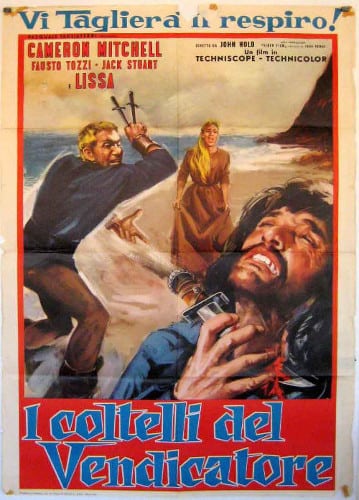
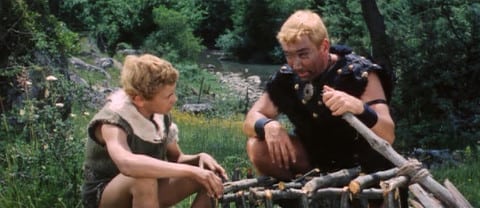
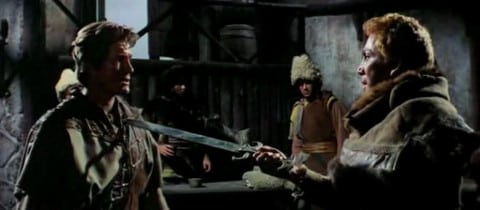



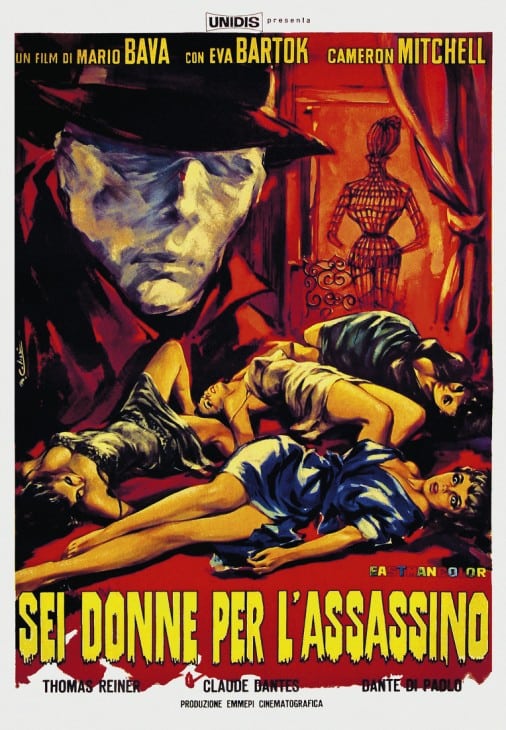
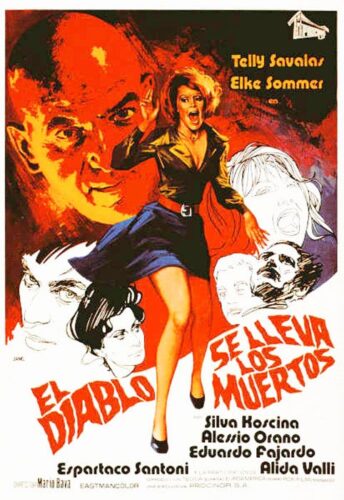
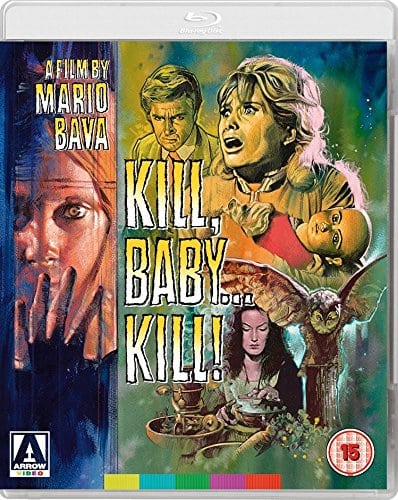
Be the first to comment